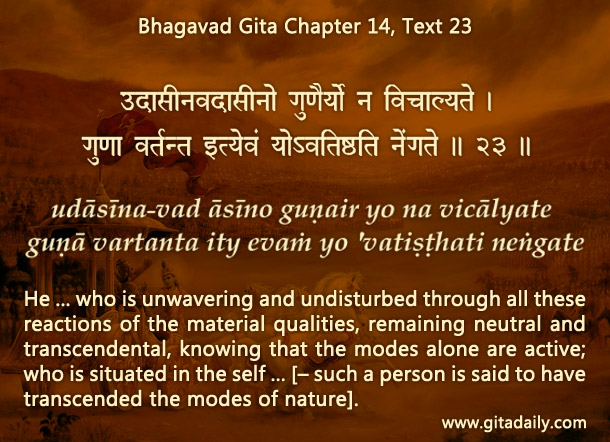Emotions are among the strongest forces that shape our actions and our life at large. Unfortunately, emotions can easily make us impulsive, leading to actions that we regret. Many thoughtful people caution against letting ourselves become controlled by our emotions and to act based on reason. Some spiritual paths deem all emotions illusory and envision spiritual perfection as a state of consciousness beyond all emotion — a state attained through reason directed toward transcendence.
However, emotions are integral to who we are. Without emotions such as love and joy and fulfillment, life would become barren and pointless. Would we like to relate intimately with someone who is an emotionless robot? Leave alone connecting closely with such a person, if someone called us an emotionless robot, we would usually consider it an insult. Additionally, even if we resolve to curb emotion using reason, reason is not always sufficient; emotion often overpowers reason.
Gita wisdom acknowledges both the pitfalls and potentials of emotions by placing them in a multi-level inner hierarchy. It explains that our inner world comprises a mind that is the locus of most of our emotions and the intelligence that is the locus of much of our reason. Significantly, it states that our essential identity lies beyond both emotion and reason — we are at our core souls.
Guided by Gita wisdom and animated by the process of yoga, we all can raise our consciousness beyond the emotional and rational levels to the spiritual level. When we are thus situated as dispassionate observers, (14.23) it’s not that we go beyond emotions themselves; we go beyond being controlled by emotions. Thereby, we can nourish our healthy emotions, neglect our unhealthy emotions, thus resolving emotional tensions.
One-sentence summary:
To resolve emotional tensions, situate yourself as a dispassionate inner observer and channel the power of emotions constructively.
Think it over:
- What’s wrong with emotions?
- What’s wrong with rejecting emotions?
- How does Gita wisdom help resolve emotional tensions?
***
14.23: He … who is unwavering and undisturbed through all these reactions of the material qualities, remaining neutral and transcendental, knowing that the modes alone are active; who is situated in the self … [– such a person is said to have transcended the modes of nature].


Leave A Comment